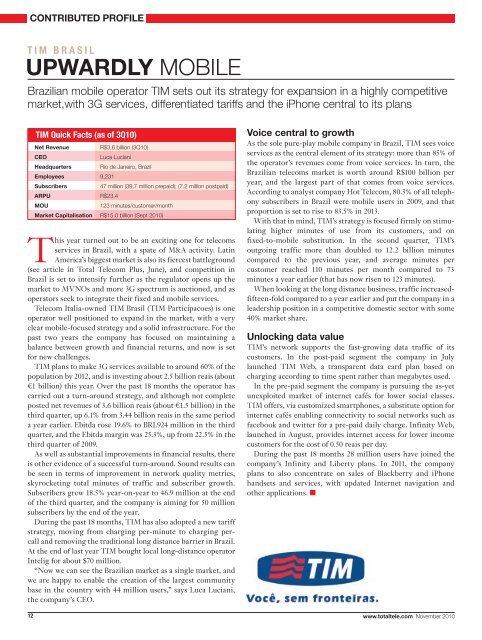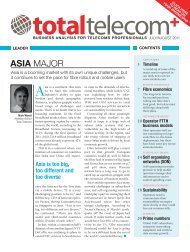ranking the world's biggest network operators - Total Telecom
ranking the world's biggest network operators - Total Telecom
ranking the world's biggest network operators - Total Telecom
You also want an ePaper? Increase the reach of your titles
YUMPU automatically turns print PDFs into web optimized ePapers that Google loves.
CONTRIBUTED PROFILE<br />
TiM BrASiL<br />
UPWARDLY MOBILE<br />
Brazilian mobile operator TIM sets out its strategy for expansion in a highly competitive<br />
market,with 3G services, differentiated tariffs and <strong>the</strong> iPhone central to its plans<br />
TIM Quick Facts (as of 3Q10)<br />
Net Revenue R$3.6 billion (3Q10)<br />
CEO Luca Luciani<br />
Headquarters Rio de Janeiro, Brazil<br />
Employees 9,231<br />
Subscribers 47 million (39.7 million prepaid); (7.2 million postpaid)<br />
ARPU R$23.4<br />
MOU 123 minutes/customer/month<br />
Market Capitalisation R$15.0 billion (Sept 2010)<br />
This year turned out to be an exciting one for telecoms<br />
services in Brazil, with a spate of M&A activity. Latin<br />
America’s <strong>biggest</strong> market is also its fiercest battleground<br />
(see article in <strong>Total</strong> <strong>Telecom</strong> Plus, June), and competition in<br />
Brazil is set to intensify fur<strong>the</strong>r as <strong>the</strong> regulator opens up <strong>the</strong><br />
market to MVNOs and more 3G spectrum is auctioned, and as<br />
<strong>operators</strong> seek to integrate <strong>the</strong>ir fixed and mobile services.<br />
<strong>Telecom</strong> Italia-owned TIM Brasil (TIM Participacoes) is one<br />
operator well positioned to expand in <strong>the</strong> market, with a very<br />
clear mobile-focused strategy and a solid infrastructure. For <strong>the</strong><br />
past two years <strong>the</strong> company has focused on maintaining a<br />
balance between growth and financial returns , and now is set<br />
for new challenges.<br />
TIM plans to make 3G services available to around 60% of <strong>the</strong><br />
population by 2012, and is investing about 2.5 billion reais (about<br />
$1 billion) this year. Over <strong>the</strong> past 18 months <strong>the</strong> operator has<br />
carried out a turn-around strategy, and although not complete<br />
posted net revenues of 3.6 billion reais (about $1.5 billion) in <strong>the</strong><br />
third quarter, up 6.1% from 3.44 billion reais in <strong>the</strong> same period<br />
a year earlier. Ebitda rose 19.6% to BRL924 million in <strong>the</strong> third<br />
quarter, and <strong>the</strong> Ebitda margin was 25.3%, up from 22.5% in <strong>the</strong><br />
third quarter of 2009.<br />
As well as substantial improvements in financial results, <strong>the</strong>re<br />
is o<strong>the</strong>r evidence of a successful turn-around. Sound results can<br />
be seen in terms of improvement in <strong>network</strong> quality metrics,<br />
skyrocketing total minutes of traffic and subscriber growth .<br />
Subscribers grew 18.5% year-on-year to 46.9 million at <strong>the</strong> end<br />
of <strong>the</strong> third quarter, and <strong>the</strong> company is aiming for 50 million<br />
subscribers by <strong>the</strong> end of <strong>the</strong> year.<br />
During <strong>the</strong> past 18 months, TIM has also adopted a new tariff<br />
strategy, moving from charging per-minute to charging percall<br />
and removing <strong>the</strong> traditional long distance barrier in Brazil.<br />
At <strong>the</strong> end of last year TIM bought local long-distance operator<br />
Intelig for about $70 million.<br />
“Now we can see <strong>the</strong> Brazilian market as a single market, and<br />
we are happy to enable <strong>the</strong> creation of <strong>the</strong> largest community<br />
base in <strong>the</strong> country with 44 million users,” says Luca Luciani,<br />
<strong>the</strong> company’s CEO.<br />
voice central to growth<br />
As <strong>the</strong> sole pure-play mobile company in Brazil, TIM sees voice<br />
services as <strong>the</strong> central element of its strategy: more than 85% of<br />
<strong>the</strong> operator’s revenues come from voice services. In turn, <strong>the</strong><br />
Brazilian telecoms market is worth around R$100 billion per<br />
year, and <strong>the</strong> largest part of that comes from voice services.<br />
According to analyst company Hot <strong>Telecom</strong>, 80.3% of all telephony<br />
subscribers in Brazil were mobile users in 2009, and that<br />
proportion is set to rise to 83.5% in 2013.<br />
With that in mind, TIM’s strategy is focused firmly on stimulating<br />
higher minutes of use from its customers, and on<br />
fixed-to-mobile substitution. In <strong>the</strong> second quarter, TIM’s<br />
outgoing traffic more than doubled to 12.2 billion minutes<br />
compared to <strong>the</strong> previous year, and average minutes per<br />
customer reached 110 minutes per month compared to 73<br />
minutes a year earlier (that has now risen to 123 minutes).<br />
When looking at <strong>the</strong> long distance business, traffic increasedfifteen-fold<br />
compared to a year earlier and put <strong>the</strong> company in a<br />
leadership position in a competitive domestic sector with some<br />
40% market share.<br />
Unlocking data value<br />
TIM’s <strong>network</strong> supports <strong>the</strong> fast-growing data traffic of its<br />
customers. In <strong>the</strong> post-paid segment <strong>the</strong> company in July<br />
launched TIM Web, a transparent data card plan based on<br />
charging according to time spent ra<strong>the</strong>r than megabytes used.<br />
In <strong>the</strong> pre-paid segment <strong>the</strong> company is pursuing <strong>the</strong> as-yet<br />
unexploited market of internet cafés for lower social classes.<br />
TIM offers, via customized smartphones, a substitute option for<br />
internet cafés enabling connectivity to social <strong>network</strong>s such as<br />
facebook and twitter for a pre-paid daily charge. Infinity Web,<br />
launched in August, provides internet access for lower income<br />
customers for <strong>the</strong> cost of 0.50 reais per day.<br />
During <strong>the</strong> past 18 months 28 million users have joined <strong>the</strong><br />
company’s Infinity and Liberty plans. In 2011, <strong>the</strong> company<br />
plans to also concentrate on sales of Blackberry and iPhone<br />
handsets and services, with updated Internet navigation and<br />
o<strong>the</strong>r applications. n<br />
12 www.totaltele.com November 2010




